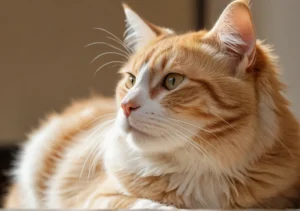Have you found yourself wondering, “Why does my cat smell like rubber?” If so, you’re not alone. It can be concerning when your beloved feline friend starts emitting a peculiar odor that resembles rubber. But fear not, as there are several reasons why this may be happening. Let’s explore some possible explanations for this unusual scent and what you can do about it.
The answer: If your cat smells like rubber, it could be due to a number of factors. One common reason is that your cat may have stepped in something sticky or gummy, such as tar or adhesive, which could be causing the odor. Another possibility is that your cat could be secreting a foul-smelling substance from their anal glands, which can sometimes have a rubbery scent.
Poor grooming habits
If your cat has a peculiar rubber-like smell, it could be due to poor grooming habits. Cats are known for being meticulous groomers, constantly licking themselves to keep clean. However, if your feline friend is neglecting this essential task, it can lead to a buildup of oils, dirt, and bacteria on their fur, resulting in an unpleasant odor that resembles rubber.
To tackle this issue, encourage regular grooming sessions with your cat. Use a soft brush to help remove any dirt or debris from their fur, and consider using cat-friendly wipes to clean their coat gently. Additionally, ensure your cat has access to fresh water at all times, as hydration plays a crucial role in maintaining a healthy coat and skin.
Remember, a well-groomed cat is a happy cat, so make grooming a regular part of your pet care routine to prevent any unwanted odors from developing.
Skin infections
A less obvious but serious cause of your cat smelling like rubber could be skin infections. Fungal or bacterial infections on your cat’s skin can produce a distinct odor that resembles rubber or even a yeasty smell.
If you notice your cat’s skin looks red, irritated, or they are scratching excessively, it’s essential to consult your veterinarian. Skin infections require specific treatment, which may include medicated shampoos, topical ointments, or oral medications prescribed by a professional.
To help prevent skin infections in your cat, maintain a clean living environment and provide a balanced diet rich in essential nutrients. Additionally, regularly check your cat’s skin for any abnormalities and address them promptly to avoid any potential infections.
Remember, your cat’s skin health is crucial for their overall well-being, so prioritize proper skincare to keep your feline friend smelling fresh and clean.
Additional Unique Insight:
In addition to grooming and skin infections, another possible reason your cat may smell like rubber is due to dietary issues. Certain foods can affect your cat’s body odor, leading to unusual smells emanating from their fur. To address this, consider switching to a high-quality cat food that is suited to your cat’s specific needs and preferences. Consult with your veterinarian to ensure your cat is receiving the right nutrients for optimal health and a pleasant scent. Remember, a balanced diet plays a significant role in your cat’s overall scent and well-being.
Diet
If your cat smells like rubber, it could be linked to their diet. Consider any recent changes in their food. Some cats may have sensitivities to certain ingredients, causing a distinct odor. Consult your vet to rule out any potential food allergies or dietary issues. Make sure your cat is getting a balanced diet tailored to their needs to help eliminate any unpleasant smells.
Environmental factors
The environment your cat is in could also be a contributing factor to that rubbery smell. Check for any sources of odors in your home that your cat may have come into contact with. Sometimes, cats can pick up scents from household items, cleaning products, or even their litter box. Ensure your cat’s living space is clean and free of any potential odor-causing substances. This will help keep your feline friend smelling fresh and clean.
- Regularly clean your cat’s bedding and litter box to prevent odors from lingering
- Keep household items containing rubber or similar materials out of your cat’s reach to avoid any transfer of scents
- Consider using pet-friendly air fresheners or odor eliminators to maintain a pleasant-smelling environment for your cat
Remember, a healthy and clean environment, coupled with a balanced diet, can help ensure your cat smells fresh and pleasant.
Dental issues
Dental problems can sometimes be the culprit behind your cat smelling like rubber. If your feline friend has poor oral health, it can lead to a buildup of bacteria in their mouth, causing a funky odor. This could be due to issues such as gingivitis, periodontal disease, or even a rotten tooth. Regular dental check-ups and cleanings are essential to prevent these problems and keep your cat’s breath smelling fresh. If you notice a rubbery smell coming from your cat’s mouth, it may be time to schedule a visit to the vet for a dental examination.
Stress and anxiety
Just like humans, cats can also experience stress and anxiety, which can affect their scent glands and result in unusual odors. When cats feel anxious or threatened, they may release pheromones that can give off a rubber-like smell. This can happen in situations such as moving to a new home, introducing a new pet, or even loud noises like thunderstorms. Creating a calm and safe environment for your cat, providing hiding spots, and using pheromone diffusers can help reduce their stress levels and prevent any strange odors from developing.
Additional Unique Insight: Your cat’s litter box hygiene can also play a role in their scent. If the litter box is not cleaned regularly or if your cat is experiencing urinary issues, it can lead to a rubbery smell. Make sure to scoop the litter box daily, change the litter frequently, and monitor your cat’s urinary habits to ensure their litter box is clean and odor-free.
Potential health concerns
If your feline friend is emitting a rubbery odor, it could be a sign of an underlying health issue. One common culprit is an ear infection, especially if the smell seems to be coming from their ears. Ear infections can be caused by bacteria, yeast, or mites, so it’s essential to have your vet examine your cat’s ears for proper diagnosis and treatment.
Another possible health concern could be related to your cat’s oral health. Dental issues, such as gum disease or infections, can also produce a rubbery smell. Regular dental check-ups with your veterinarian can help prevent and address these problems.
Additionally, a strong rubber-like scent could be a sign of a skin infection or a skin condition like seborrhea. These conditions can result in abnormal skin secretions that create the distinctive smell. Your vet can recommend appropriate treatments to alleviate these issues.
In some cases, a rubbery odor may be linked to kidney problems, diabetes, or even metabolic disorders. If you notice other symptoms such as increased thirst, weight loss, or changes in litter box habits, it’s crucial to seek veterinary attention promptly.
Overall, any unusual odor emanating from your cat should not be ignored. Your furry companion’s well-being is a top priority, so if you’re concerned about their smell or suspect an underlying health issue, don’t hesitate to contact your vet for guidance and appropriate care.
Additional insight:
Maintaining regular grooming habits for your cat, such as brushing their coat and teeth, can help prevent certain health issues that may contribute to unusual odors. Additionally, providing a balanced diet, plenty of fresh water, and engaging in routine vet visits can significantly impact your cat’s overall health and well-being.
Remember, being proactive about your cat’s health can lead to a happier, healthier companion by your side.
Alex, a passionate animal lover, has experience in training and understanding animal behavior. As a proud pet parent to two dogs and three cats, he founded AnimalReport.net to share insights from animal experts and expand his knowledge of the animal kingdom.




